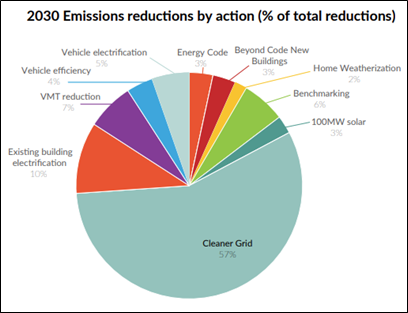
Milwaukee, Wisconsin recently passed an energy benchmarking ordinance, a proven method for reducing building energy use in as little as one year after reporting. This is a significant achievement for Milwaukee, as it is an important step positioned by their recently adopted Climate and Equity Plan.
Milwaukee has been tracking energy data in its city-owned buildings since 2009; in a meeting on July 2nd, the City Council voted 14:0 to expand this practice (Ordinance 240297). Public buildings 10,000 square feet or larger will be required to report their annual data beginning June 30, 2025. Commercial and multifamily buildings 50,000 square feet or larger have additional time to comply, with their first deadline set for June 30, 2026. This impacts around 950 commercial buildings, 12% of which are already reporting their annual data.
A benchmarking policy requires buildings to report their annual energy usage into ENERGY STAR Portfolio Manager, a free software tool administered by the EPA. Building owners input building characteristics like square footage and number of occupants along with electric and gas data obtained from utilities. Simply by reporting annual data, buildings see an average of 7.2% reduction in energy use over three years. With this data publicly available, stakeholders can compare a building to itself over time and to other buildings with similar characteristics. Milwaukee will be developing a Commercial Buildings Help Desk that will provide building owners with a report on their building’s performance compared to similar buildings in the city, along with recommended sources of rebates, incentives and financing. The Help Desk will also offer support throughout the process to increase compliance.
For more than a decade, Milwaukee has shown its commitment to improving building efficiency through its participation in the Department of Energy’s Better Buildings Challenge. This commitment was emphasized in the City’s Climate and Equity Plan, signed into law by Mayor Johnson in June 2023. The plan outlined ten “big ideas,” three of them related to building efficiency. Idea four, aptly named “Commercial Building Benchmarking and Performance Standards,” sets the goal of using a benchmarking policy to measure the performance of Milwaukee’s existing commercial building stock. By measuring the usage, the City is better positioned to institute a building performance standard using metrics obtained from benchmarking data. Milwaukee’s plan also seeks a 45% reduction in emissions by 2030, with an eventual goal of toting net-zero status by 2050. Benchmarking has been projected to reduce 6% of the city’s current emissions towards the 45% reduction goal.

Figure 1: Milwaukee's Projected Emissions Reduction Steps (source: City of Milwaukee - File #: 240297)
The policy was informed by Milwaukee’s climate goals and input garnered from the public. In a public engagement process started in the spring of 2022, Environmental Collaboration Office (ECO) staff held feedback sessions with utilities, government stakeholders, building operators and residents, among others. These sessions benefited policy development by informing city staff of the anticipated benefits and limitations of the policy. Read the benchmarking FAQ page prepared by ECO staff based on community input here.
There’s a reason Milwaukee called for a benchmarking policy in its Climate and Equity Plan— other cities have demonstrated that its benefits extend wide. Besides positive environmental outcomes, the effects of benchmarking policies include:
- Economic growth by creating green jobs, as efficiency upgrades drive demand for jobs including solar technicians, HVAC mechanics and energy auditors.
- Reductions in residents’ utility bills; the Cream City currently spends over $1 billion annually on electricity and natural gas, including bills paid by owners and renters.
- Reducing energy burden equitably; energy benchmarking pinpoints low-performing neighborhoods or buildings, which can inform strategic investments of municipal resources. Equitable advancements can help reduce Milwaukee’s racial disparity of energy burdens and have tangible impacts on residents.
This is the second city in the Badger State to adopt a benchmarking policy, Madison being the first in 2023. Across MEEA’s region, there are 16 municipalities with mandatory benchmarking ordinances. Read more about them here.